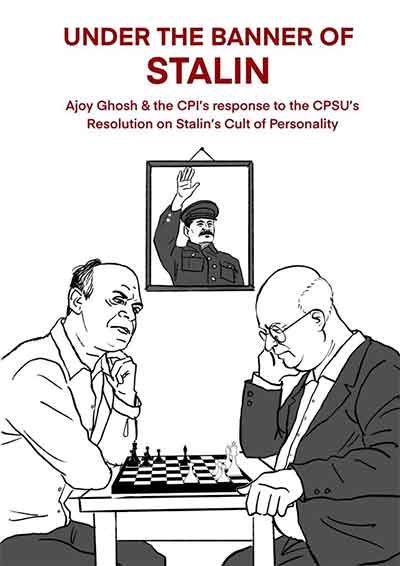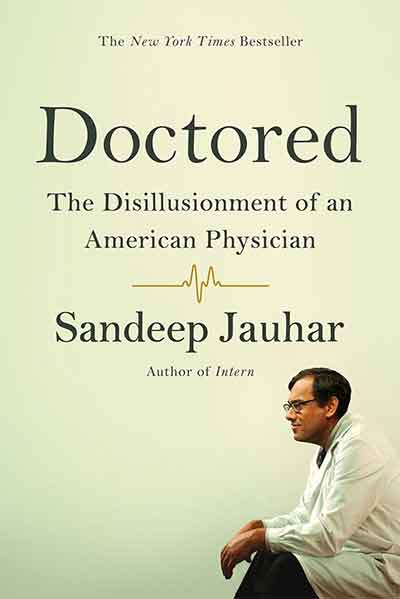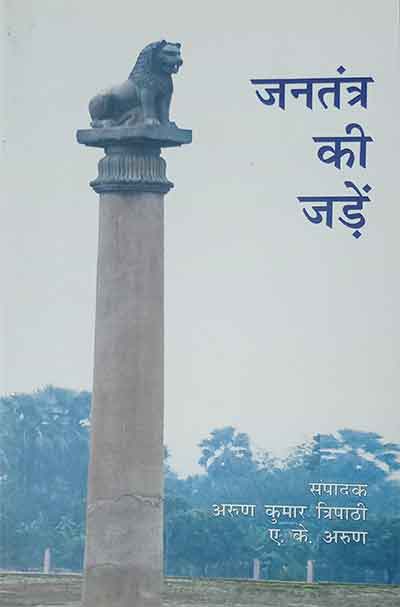 ‘Under the Banner of Stalin ‘, is a compilation of articles published by Magpie, edited by Basu Acharya and introduced by Grover Furr ,that vividly illustrates the true contribution of Stalin to Marxism-Leninism and in constructing Socialism in Russia. It attempts to project Stalin in balanced perspective weighing his pros and cons. It places issues like personality cult, suppression of opposition, errors of mass line, under a microscope. Basu Acharya should be congratulated for a most analytical note as an editor of this book. The book highlights the writings of former CPI secretary from 1951-6,Ajoy Ghosh .Today the Western media has completely demonised Stalin, treating him as a dictator like Hitler, and grinding all achievements of USSR under assessed Stalin for building a society or state of the working class and a creative revolution ,or even George Bernard Shaw, E.H Carr or Sydney and Beatrice Webb.
‘Under the Banner of Stalin ‘, is a compilation of articles published by Magpie, edited by Basu Acharya and introduced by Grover Furr ,that vividly illustrates the true contribution of Stalin to Marxism-Leninism and in constructing Socialism in Russia. It attempts to project Stalin in balanced perspective weighing his pros and cons. It places issues like personality cult, suppression of opposition, errors of mass line, under a microscope. Basu Acharya should be congratulated for a most analytical note as an editor of this book. The book highlights the writings of former CPI secretary from 1951-6,Ajoy Ghosh .Today the Western media has completely demonised Stalin, treating him as a dictator like Hitler, and grinding all achievements of USSR under assessed Stalin for building a society or state of the working class and a creative revolution ,or even George Bernard Shaw, E.H Carr or Sydney and Beatrice Webb.
Grover Furr Introduction
In the Introduction by Grover Furr there is a summary of the why Khrushchev narrated lies on Stalin .In Furr’s view it was a result of Khrushchev’s disagreement with Stalin’s political line. Examples were given of Khrushchev’s formula on peaceful co existence and peaceful competition with capitalism and imperialism.
Another reason for attack on Stalin was Stalin’s and police Chief Beria’s attempts to reform the govt.
Grover asserted that Khrushchev offered scant evidence on Stalinst terror. .In 1962, a conference of party historians was denied access to Party archives, which documented information contradictory to what Stalin portrayed. Even many bourgeois historians projected any primary source of evidence.
The collapse of USSR in 1991 .enabled many documents from former Soviet archives to be documented. It paved the path to expose the false allegations of Khrushchev and Gorbachev.Both resurrected Trotskyite movement, giving credibility that Stalin murdered Sergei Kirov.
When Gorbachev made an about turn from installing market mechanisms at a much deeper scale, he claimed he was reverting to the New Economic policy of Lenin.
In post-Stalin era Furr illustrated how academic historians gave virtually no credit to USSR for achieving collectivisation of agriculture, building an industrial economy in less than a dozen areas, giving tacit support to anti-colonial struggles and to Revolutions in China and Eastern Europe and enabling communism to spread over the globe.
Furr praised the book for releasing primary source evidence from former Soviet archives, which is preparing the ground worldwide .for re-evaluation of Stalin, by projecting his true achievements. Doctrinarianism was promoted in the party, stifling initiative and flexible approach. Security forces exerted enormous power or authority, with Beria committing huge excesses.
Analysis of Chapters
Ajay Ghosh,The former General Secretary of the Undivided Communist Party of India probes into the Stalin question with an open and independent mind, when the bulk of cadres of the Communist Party of India blindly toed the line of the CPI.
The first piece discusses the significance of Stalin’s last major theoretical work Economic Problems of Socialism in the USSR and his speech at the 19th party Congress that exposed the strategy of the capitalist-imperialist countries, led by the U.S.A. Ghosh elaborated how the humiliating defeat of the fascist forces at the hands of the Soviet Red Army created a major shift in power balance of Socialist and Peoples Democratic States. However Ghosh expresses how it would not extinguish war possibilities, with imperialism and war co-relating in fragmenting the already splintered world.
Incisively, Furr probes into how India shaped into a semi-colony. Similar to Mao Zedong,Ghosh understood the semi-independent nature of India. He appealed to the C.P.I., his own party, to defend ‘National Independence.’
The 2nd piece deal with Stalin’s serious illness.Ghosh was possibly instigated by reports on Stalin’s health deteriorating. The content itself indicated that it sensed Stalin’s death.
The 3rd article Ghosh projects how the departure of Stalin, orchestrated a split patronised by imperialism within the Communist Movement. Examples were cited of the Yugoslav experience of 1948.Stil he maintained healthy terms with the USSR and CPSU.
In the 4th piece Ghosh in For a Lasting Peace and For a Peoples Democracy projected Stalin’s invaluable role in sphere of theory and practice.
In the 5th part Ghosh addressed the aspect on the cult of Stalin. This is the most important or defining chapter of the book. He justified Khrushchev’s criticisms but at the same time was critical of the CPSU leadership’s unbalanced approach or methods in analysing Stalin.Ghosh openly stated that he lacked a clear explanation of the personality cult or what planted it’s genesis .At Palghat,Ghosh struck a balance between Stalin’s role in constructing Socialism and theory of Marxism-Leninism to Stalin’s errors in violating internal democracy or Social legality. Ghosh condemns Beria, although he tooth and nail fought against Trotskyite-Zinovievite trends, within the security forces. Beria had reviewed many cases of arrested political prisoners in Yagoda and Yezhov, with many being released and re habilitated.
Ghosh touched upon aspect of failure of inner party democracy, collective functioning, and self-correction, ascendancy of personality cult permeated.. Ghosh delved on how Stalin came to foster spirit of an individual being fallible, with no self –criticism of mistakes. What was criticised was not merely Stalin, but method of leadership that evolved in the USSR.Ghosh pondered on what planted the seeds for elevation of the personality cult, giving an example of the Biography of Stalin, which Ghosh felt converted Stalin into a demi-god. Ghosh praised the evaluation of the Chinese Communist party in The New Age.
A most important subject Ghosh dealt with was on the mistake of the CPSU in assessing that class struggle had been completely undertaken with social classes abolished completely. He pointed out how capitalist thinking still penetrated the minds of men for a long period, and sustained struggle could never be terminated. The concept that class struggle intensified as Socialist Society grew stronger and stronger was gross misconception. This trend bred excessive reliance on police power and brand people with political differences as ‘enemies of the people.’ It also pave way for breaking the backbone of the International Communist movement .
In the sixth piece Ghosh launches a vendetta against the CPSU for irresponsible handling of the Khrushchev issue and dismantling the framework of the International Communist Movement. In many ways it is a supplement to the article addressing trend of personality cult.Ghosh stated that Khrushchev’s report manifested great subjectivism in analysing Stalin’s role which would cause world people to reject ideology of Communism.
Ghosh addressed the role of the CPSU for the present crisis. He recounted how enemies used the contents report to malign the Socialist sytem,Soviet democracy and the dictatorship of the proletariat. It also reached the mass of members of Communist parties in a most humiliating manner. Finally it compelled Communist parties to revise their positions .Without an adequate explanation, parties made statements in criticism of Stalin, and praised the Kruschevite leadership. This manifested a stage managed situation. In totality Ghosh asserted, that it placed every Communist party in the depths of despair Ghosh placed the entire responsibility on the leadership of the CPSU, which in a most irresponsible way dealt with the matter. It lacked a coherent, balanced, Marxist appraisal placing shortcomings of Stalin in a proper perspective. All the shortcomings of the Soviet state, failures and mistakes are ascribed to Stalin. Presenting such a distorted or subjective picture, it re-inforces the cult of the individual. The report awarded no recognition to the positive achievements of Stalin or duration of 20 years in development of Marxism, constructing Socialism in USSR, and leading the International Communist Movement.
Ghosh also expressed disgust that the CPSU leadership reposed no confidence on the leaders of the brother parties who had assembled in the 20th Congress. Assessment of Stalin and mistakes entailed a task of the whole Communist movement and not CPSU alone. The leadership of brother parties were bewildered, with many divergent opinions cropping up.
Overall Ghosh credited USSR for rendering great service to the Soviet people, people’s democracies and to the International Communist movement as a whole.
In the seventh chapter a letter of Ajay Ghosh was published. Here he was critical of highlighting only Stalin’s crimes, but negating his achievements. It stated nothing about the role of many other people It was difficult to oppose Stalin openly. The report offered no explanation for what permeated such a phenomena .Ghosh was critical of Stalin being dubbed as a planner of military manoeuvres on a globe. Ghosh touched upon the aspects of an Individual’s rights within the framework of a Socialist Society, He elaborated on whether a Soviet citizen be critical of the Communist party or openly be critical of glorification of Stalin.
Ghosh praised article of Italian Communist leader Togliatti, but was convinced that many questions were left unanswered.
The last chapter publishes a tribute to Stalin. It expresses admiration for Stalin’ unflinching commitment in constructing a Socialist Society. The report encompasses USSR being converted from backward Industrial country to a mighty industrial power. It illustrated how the economic planning Of the USSR, was a model for nations.
It expressed how Marxists must be aware of why it was imperative for USSR to adopt certain measures having to confront external enemies and prevent the internal bureaucracy from penetrating counter revolution. Soviet bureaucracy was hand in glove with world Imperialism. The entire programme of restoring capitalism was undertaken with so much secrecy that fraternal parties were completely ignorant of the transformations within the Soviet state. By 1955 the system of centralised directive planning was extinguished and replaced by decentralised planning. Measures were undertaken to create a sea of private producers working for profit. The closed speech of Stalin in 1956 destroyed the authority of the Soviet leader and paved way for the conversion o means of production in Soviet industry and labour power into commodities. Political economy of socialism was dismantled.
Conclusion
I give enormous credit for Ajoy Ghose for illustrating tremendous insight into perceiving the Kruschevite gross distortions on Stalin and undertaking one of the most constructive debates or clinical dissections within the Communist Movement. He lays the parameters for evaluating Stalin.His writings projected the inherent shortcomings within the Stalinist rule itself in USSR, but within the very thick of the skin defended Stalin’s contribution towards building a Socialist Society and developing Leninsm.One cannot blame Ghose for not completely reading between the lines on Khrushchev’s revisionist turn .
.Readers should not blindly eulogise Stalin and should critically assess the book, thinking for themselves. The book should give readers an insight into the comprehensive manner the bourgeois media distorted truth about USSR under Stalin and never portrayed the circumstances Stalin and USSR faced, being encircled by imperialist and fascist powers. I feel the evaluation of CPC was correct in Stalin being 70% correct and 30% wrong, but this is open to debate. Stalin failed to mobilise democratic mass movements from below, analysing that a Socialist society had been completely achieved. Stalin only deployed secret police terror to counter enemies within the party, failing to launch a Cultural Revolution to check the bureaucracy.
I recommend reading of the writings of Grover Furr, in investigating the conspiracy of Leon Trotsky in overthrowing the Soviet state and to research on why Trotskyism was anti-Marxists. Even if certain crimes were committed in the Stalin era, with execution of innocent people, one must weigh the contribution of the left opposition, who patronised espionage. and infiltration of imperialist backed counter revolutionaries. Possibly the introduction should have projected the gross errors of Stalin in suppressing opposition and even how Socialist systems lacked complete democracy.
The subject of Leninist vanguard party could also have been discussed critically, summarising germinating of bureaucracy within Soviets, and how masses failed to supervise the Communist party. Light could have been thrown on whether mere 2 line struggle within a Communist party established genuine Socialist democracy. Most important aspect is the manner Stalin upheld and violated Leninist massline in different junctures.
It was worth quoting in the book, Fred Engst “Stalin neglected mass supervision and only stressed importance of the party. He did not distinguish between conscious and unconscious capitalist roaders. He also did not place trust in the people, eliminating opponents blindly. Stalin might be bastard, but he must be our bastard, as he strived to establish working class power and obstruct capitalist restoration.”
Harsh Thakor is a freelance journalist who has done extensive research on History of the Communist Movement

















































